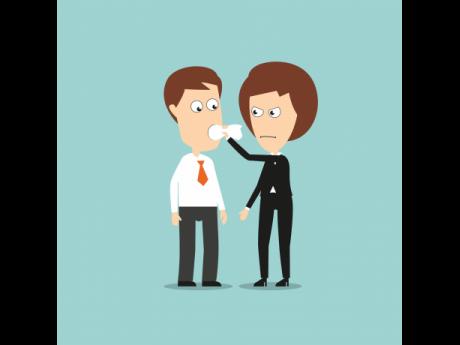Men don’t tell … but wives beat husbands too
Oh Delilah made Sammy's life a sin
And he perished when the roof fell in
There's a moral so listen to me pal
There's a little of Delilah in each and every gal
- Run Samson Run, Neil Sedaka
Most times, when the subject of domestic violence is discussed, there is a 99 per cent chance the focus will be on a female victim.
Visit any expo and the poster encouraging victims to seek help will depict the image of a battered woman pointing to the man in question as the abuser.
While not taking away from the reality that a lot of women are undergoing spousal abuse, there is little or no mention of men who are, themselves, caught in the same trap.
The sad part is that unlike women who can walk into a shelter or reach out to friends expecting to find sympathy and encouragement, men in this kind of situation, are afraid as they are more likely to be ridiculed.
Family and Religion reached out to Dr Michael Coombs, regional technical director, Southern Regional Health Authority, who, while admitting that women are far more affected by gender-based violence with men being the perpetrators, acknowledged that men are also victims of spousal abuse, with some studies suggesting that up to one third of victims of spousal abuse are men.
Coombs points out that it is even more difficult for men to seek help or to report the matter, "because of a feeling of shame, a perception that the police see them more as the abuser than the abused. Police anywhere in the world are quicker to think the men are the abusers. When it comes to settling, the law is stacked heavily in favour of women, especially if children are involved," said Coombs.
Many who do not understand the kinds of emotions involved in an abusive relationship have often wondered why the woman does not walk away.
The same rings true for men facing the same circumstances. Weighing in on the matter, Dr Coombs said men, too, have their reasons - be it right or wrong, for remaining in the unhealthy relationship.
Coombs said it's their innate nature to protect their children that will see them remaining.
"They may have the fear that if they leave, that connection that they have with their children might be lost. While for some men, the woman may have more resources and they fear losing that.
"Some are ashamed because of who they are as men, because of the image it will convey to friends, it's as if they are retreating, they don't want to talk about it much less leave under that kind of cloud," he said.
While for others, Dr Coombs said they will remain because of their religious convictions in keeping their marriages together.
"But if their lives are at stake, they need to be encouraged to get help," he said, pointing out the challenge that men face with a law that seems biased towards women.
Living in this kind of relationship not only hurt the man in question, but is harmful if children are in the union.
"When you have spousal abuse by either party, it definitely damage the children emotionally. It has been documented that when children witness a constant conflict it's even worse, their emotional health is influenced and they stand the risk of doing the same thing in their marriages."
For sons, according to Coombs, they see a father in a role that is not what a father is supposed to be. A father is supposed to be a provider, protector. One who nurtures and exhibit model behaviour.
"When a father is abused, clearly that son has a warped concept of who a father is. Daughter's first impression of who a man is what she sees in her dad. When she sees that she also has a warped concept who she should seek to have a relationship with she might even think its ok to abuse her husband," said Dr Coombs.
In summing up the issue, Dr Coombs said it does not matter the gender administering the abuse - domestic violence should be recognised for what it really is - the result of two main factors - poor interpersonal and conflict resolution skills and a lack of understanding of roles and responsibilities in spousal relationships," he said.
Dr Coombs added:"It's important to look at why we have gender-based conflict. It creates this kind of violence because men and women are not clear about their roles and responsibility in a relationship," he said, pointing out that one of the ways to deal with the abuse of men is for them to understand their roles.
"I don't believe that the roles are completely interchangeable, I just want to say to those promoting this view that it's nonsense. Part of the thing that leads to violence is the fact that we don't understand that as men and women, we should have different roles that complement each other," said Dr Coombs.
It is for that reason, he said, the National Association for Family in partnership with the Southern Regional Health Authority and the church as well as other partners developed an initiative called Good Health Begins at Home - a part of which is an initiative called Man Up Jamaica.
"It a call to healthy responsible manhood. In that initiative, it explores the roles of men and women in relationships. One of the objectives is to educate men first of their roles and responsibility. This will help them to understand their roles and reduce the risk of gender violence either way," he said of the programme.

